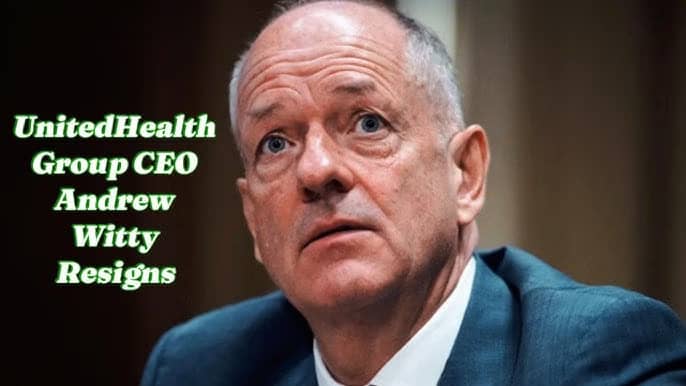UnitedHealth CEO Andrew Witty Resigns; 2025 Forecast Suspended Amid Corporate Shake-Up
Introduction
In a surprising move that has sent ripples through the healthcare and financial sectors, UnitedHealth Group announced the resignation of its Chief Executive Officer, Andrew Witty. Alongside the leadership change, the company also suspended its 2025 financial forecast, citing increased uncertainty and ongoing internal evaluations. Witty’s sudden departure marks a significant turning point for the healthcare giant, which has faced mounting operational and regulatory challenges in recent months. While the company has yet to provide detailed reasoning behind the decision, the timing suggests a broader shift in corporate strategy or a response to pressures from stakeholders.
As one of the most influential figures in the health insurance industry, Witty’s exit raises questions about UnitedHealth’s future direction, investor confidence, and overall market stability. This development has already triggered speculation among analysts and shareholders alike, as the organization navigates the complexities of a rapidly evolving healthcare landscape without its longtime leader at the helm.
Background on Andrew Witty’s Tenure
Andrew Witty took the helm at UnitedHealth Group in 2021, bringing with him decades of experience in global healthcare leadership, including a previous role as CEO of GlaxoSmithKline. Under his leadership, UnitedHealth pursued aggressive digital transformation, expanded its Optum division, and navigated through the complex challenges of the COVID-19 pandemic’s aftermath. While Witty was praised for fostering innovation and driving revenue growth, his tenure was not without controversy, including scrutiny over rising healthcare costs and regulatory pressures that have intensified in recent quarters.
Details of the Resignation
UnitedHealth Group announced Witty’s resignation in a brief statement, offering limited specifics about the reasons behind his departure. The resignation is effective immediately, with the company appointing an interim CEO while a formal search for a permanent replacement begins. Though official communications emphasize a smooth transition, the timing and lack of detailed explanation have raised concerns among investors and industry watchers. Speculation is mounting around potential internal disagreements or strategic shifts that may have influenced Witty’s abrupt exit from the leadership role.
Market and Investor Reactions
The announcement of Andrew Witty’s resignation, coupled with the suspension of UnitedHealth’s 2025 forecast, led to immediate turbulence in the stock market. Shares of UnitedHealth fell sharply in after-hours trading, reflecting uncertainty over the company’s near-term direction and financial stability. Analysts expressed concern over the leadership vacuum and the lack of clear guidance moving forward. Some investors interpreted the moves as signals of deeper operational issues, while others see the change as an opportunity for a strategic reset amid broader shifts in the healthcare landscape.
2025 Forecast Suspension Explained
The suspension of UnitedHealth’s 2025 financial forecast has added to the uncertainty surrounding the company’s immediate future. While specific reasons were not detailed, executives cited a need to reassess long-term projections in light of recent operational challenges and ongoing leadership changes. Analysts believe factors such as shifting regulatory landscapes, increased scrutiny over healthcare pricing, and internal restructuring may have influenced this decision. By halting forward guidance, UnitedHealth appears to be taking a cautious approach, signaling that the company is reevaluating its strategic priorities under evolving market conditions.
Implications for UnitedHealth’s Strategic Direction
Witty’s resignation and the halted forecast raise significant questions about the future direction of UnitedHealth. The company has been investing heavily in technology, expanding its Optum health services division, and pursuing vertical integration across its operations. With new leadership on the horizon, some of these initiatives may face reassessment or realignment. Strategic priorities, including mergers and acquisitions or regulatory compliance strategies, could shift. Stakeholders are now watching closely to see whether the company will double down on existing plans or pivot toward a new, more risk-averse approach.
Leadership Transition Plans
In the wake of Andrew Witty’s resignation, UnitedHealth has named an interim CEO while initiating a formal search for a permanent replacement. The board of directors is expected to play a central role in the transition, emphasizing continuity and stability to reassure stakeholders. While no official timeline has been released, industry experts expect a high-profile recruitment process, likely focused on candidates with deep healthcare experience and a strong operational background. Ensuring a seamless transition will be critical to restoring investor confidence and maintaining momentum in UnitedHealth’s strategic initiatives.
Industry-Wide Impact
The sudden leadership change at UnitedHealth, one of the largest and most influential players in the healthcare sector, is expected to have ripple effects across the industry. Competitors, providers, and regulators are closely monitoring the situation for signs of strategic shifts that could affect partnerships, reimbursement models, or policy trends. The suspension of the company’s financial outlook has also triggered broader concerns about volatility in the health insurance market. This development may prompt other firms to reexamine their forecasts and leadership strategies amid growing economic and regulatory pressures.
Expert Opinions and Analyst Commentary
Industry analysts have offered mixed reactions to the dual announcement of Witty’s resignation and the forecast suspension. Some view it as a warning sign of internal instability, while others see it as a necessary course correction in a rapidly changing market. Healthcare experts suggest the move could be tied to long-term strategic recalibration, particularly in response to regulatory reform and rising operational costs. Financial analysts are urging caution, noting that the lack of transparency may complicate valuation models and investor confidence in the near term.
Conclusion
The resignation of Andrew Witty as CEO of UnitedHealth Group and the suspension of its 2025 forecast represent a pivotal moment for the company and the broader healthcare industry. As the organization enters a period of leadership transition and strategic reassessment, questions remain about how it will navigate the challenges ahead. Investors, analysts, and industry stakeholders will be watching closely for updates on new leadership, revised forecasts, and shifts in corporate direction. What happens next could shape not only UnitedHealth’s future but also the evolving dynamics of healthcare in the U.S.
FAQS
Why did Andrew Witty resign?
The company said that Mr. Witty had left the job for personal reasons. Stephen Hemsley, the company’s executive chairman, will replace him. The chief executive of UnitedHealth Group, Andrew Witty, stepped down from his post for “personal reasons,” the company said in a statement on Tuesday.
Why is Andrew Witty a sir?
Witty holds the title of “Sir” after being knighted in 2012 due to his service to the United Kingdom’s economy.
Who is Andrew Witty married to?
Personal life. Witty is married to Caroline Hall. He has two children.
How long was Andrew Witty CEO of United Healthcare?
four years
Witty, who ran the health care giant for four years, will remain in a limited role as a senior adviser to Hemsley.
Why did Andrew get detention?
Andrew became influenced by jock culture and is intimidated by his father to succeed in wrestling. He was given detention for taping a student’s buttocks together in an attempt to win both his teammates’ and his father’s approval.
Why did Andrew decide to remain?
He needed some rest and sleep. He knew that he could not sleep even for an hour if he went home. Secondly, he knew that the case would demand all his attention. He felt lethargic and decided to remain there until everything was over.
Why is UHG stock dropping?
UnitedHealth stock sank nearly 18% in trading Tuesday, marking the company’s latest negative day in an over 38% year-to-date plunge. UnitedHealth has been hammered in a number of ways: increased costs, political pressure over its size, and scrutiny by the Federal Trade Commission and Department of Justice.






